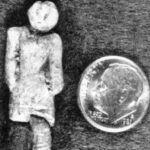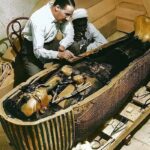-

Imagine this: it’s 1889 in Nampa, Idaho, and a team of workers drilling a water well stumbles upon a discovery that defies everything we thought we knew about human history.
•
Enter the Nampa figurine—a small, mysterious artifact unearthed by chance, and dated to a staggering 2 million years old. That’s right, 2 million years! To put this into perspective, this predates North America’s earliest known human presence by hundreds of thousands of years.So, what exactly is this enigmatic figurine? Carved…
-

Horace Seaver “Stump” Carswell Jr. was a United States Army major who was killed in action while serving as a member of the Army Air Forces during World War II. He was posthumously awarded the Medal of Honor.
•
After the German invasion of Poland, Carswell decided to join the U.S. Army Air Forces. He was appointed a flying cadet in Dallas on March 26, 1940, and trained at Tulsa, Oklahoma, and Randolph and Kelly Fields, Texas, getting his commission and wings toward the end of 1940. He instructed…
-

Carter and one of the foremen work on the innermost coffin of the Egyptian pharaoh (colorized photo).
•
The tomb of Tutankhamun was discovered in the Valley of the Kings on 04 November 1922 by excavators led by Egyptologist Howard Carter, more than 3,300 years after Tutankhamun’s death and burial. On 4 November a worker uncovered a step in the rock. According to Carter’s published account the workmen…
-

Petrified iron ladder, somewhere in France. The ladder most likely underwent the process of calcification.
•
Being laid on the limestone surroundings known to contain calcium carbonate, when the rainwater poured over, it dissolved the carbonate compounds contained in limestone and subsequently soaked the surface of the ladder in calcium and magnesium ions. Over time, the minerals solidified and petrified the ladder’s surface. Although researchers estimate…
-

In 2021, Argentine farmer Juan de Dios Sota made a stunning discovery while tending his field near Rincón de Valle: four massive Glyptodon armored shells, buried for over 10,000 years.
•
These prehistoric creatures, similar to giant armadillos, roamed the Earth during the last Ice Age (the Pleistocene epoch). The rare find of multiple armored shells together suggests this site may have been a significant gathering place for these ancient giants. The Glyptodons’ final resting place likely resulted from a sudden,…
-

This 1899 photograph of two women strolling past horse-drawn carriages in New York City captures urban life at the turn of the 20th century.
•
At the time, horse-drawn carriages were not only a common mode of transport but also a symbol of wealth and status. The women’s elaborate Victorian-era fashions reflect the period’s emphasis on formality and decorum. As New York’s streets became more crowded, these carriages were central to the city’s bustling atmosphere.…
-

Many people are thinking that Africa had no history.
•
However, historical and archeological studies have proven that Africa has a richer and greater history than ancient historians have tried to have us believe.
-

Meet Madam Jeanne Louise Calment, who had the longest confirmed human lifespan: 122 years, 164 days.
•
Apparently, fate strongly approved of the way she lived her life. She was born in Arles, France, on February 21, 1875. The Eiffel Tower was built when she was 14 years old. It was at this time she met Vincent van Gogh. “He was dirty, badly dressed, and disagreeable,” she…
-

“My daughter was out looking for a photo of ‘nature’ for her photography class.
•
We went down to the fairgrounds to maybe get a picture of a lake or some ducks.After taking lots of pictures and on our way back to the car she found a true hidden secret of nature, something my Grandpa showed me when I was little, and I showed my…
